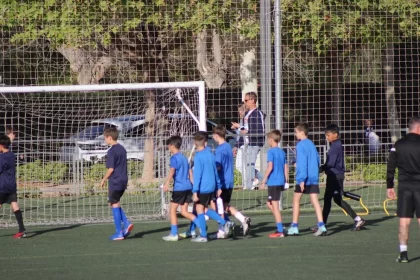
For young athletes dreaming of making a career in professional football, the right environment can make all the difference. Although Football in India has grown significantly, with the emergence of ISL, and improved football infrastructure in India, moving to Europe can be the game-changing career choice for budding football players. Irrespective of the field, if you want to improve, you must compete with the best and have access to modern-day training facilities and coaching methods.
Europe has a robust football infrastructure and a sports ecosystem that aligns perfectly with academics. If you are a young Indian footballer dreaming of playing in leagues such as La Liga, the Bundesliga, and the Premier League, joining a football academy in Europe is a no-brainer. Here’s why relocating to Europe as a family can play a vital role in building a successful sports career.
1. Access to Premier Football Infrastructure
No doubt that the football infrastructure in India is growing. The emergence of ISL has brought investment into the sport, and some of that money is going into the development of grassroots football. But the Indian football setup is still a million miles away from matching the standards of the European football system. To be honest, the difference in the quality of coaches and training methods in India and Europe is huge. In Europe, players are trained by UEFA-certified coaches and play in competitive leagues right from their formative years.
Relocating to Europe opens doors to modern training methods. Talented athletes can grow at an exponential rate, and that opens doors to leagues like the Premier League, La Liga, and the Bundesliga.
2. Competing in Top Youth Leagues
One of the most significant benefits of relocating to Europe is the ability for young players to compete in youth leagues across various age groups. Unlike other foreign players who may face restrictions, players whose families relocate have equal opportunities to participate in these leagues, just like local players. This level playing field allows them to compete at the same level as their peers, ensuring they gain invaluable match experience and exposure to scouts and professional clubs. The leagues in Spain, UK or Germany serve as a platform for players to prove their skills, develop tactical understanding, and grow in a highly competitive environment.
3. Meeting FIFA’s Eligibility Requirements
For non-EU players under 18, FIFA’s stringent rules on international transfers can pose a challenge. However, one of the exceptions is when the family relocates for “non-footballing reasons,” such as employment or education. By moving to Europe, parents can ensure their children meet the residency criteria and schooling requirements, enabling them to register and compete in Europe’s youth leagues. This step lays the groundwork for future professional opportunities.
4. Exposure to Professional Pathways
Europe’s robust football ecosystems offer a clear pathway to becoming a professional football player. Football academies in Europe have ties with big clubs and these academies often serve as a feeder club to professional clubs. In addition, big football clubs also run their academies which play in various youth leagues. The system works in a way that a talented player can easily graduate from the Club’s A-Team to B-Team and then to the main team, offering a direct pathway to professional contracts.
5. The Role of Language in Integration
If you are looking to train in Europe, you need to get accustomed to the culture of the region as well. There’s a reason why many African players play for the French national football team: most of these players come from African countries where French is spoken, so for them, it’s easier to integrate into the French football ecosystem.
That’s why it’s important for an Indian football player looking to play in Europe to learn the language of the country they’re moving to. If you are enrolling in a football academy in Spain, for example, you must learn Spanish. Being fluent in the local language allows players to communicate effectively with coaches, teammates, and support staff, fostering better teamwork and understanding of tactical instructions. Moreover, it helps players integrate seamlessly into their new environment, building friendships and cultural connections that enhance their overall experience.
6. Enhanced Career Prospects
During a podcast, India’s legendary footballer Sunil Chhetri highlighted an instance from his career. He humbly pointed out that when he signed for Sporting Lisbon back in 2012, he was shocked to see the difference between Indian football and the 2nd tier of Portugal’s football system. He highlighted that the difference between him and his teammates at Sporting, was not in the skills as much, but in the passing, and how they trained in Lisbon. Chhetri made it a point that if an Indian player wants to play in Europe, he has to train in Europe, there’s no other pathway to play in European clubs. If you are young and have the talent, your first aim should be to find a good football academy in Europe and get enrolled.
7. Building a Long-Term Sports Career
For aspiring sports athletes concerned about making a successful sports career in India, the solution often lies in leveraging opportunities. India has become a force in wrestling and Badminton because players are training in Europe and the USA, spending formative years in world-class facilities, training under renowned coaches. Again, it’s all about who you trained with and how you train. Lionel Messi became the footballer we know because he trained with the likes of Xavi, Iniesta and Sergio Busquets and had players such as Ronaldinho and Carlos Puyol to guide him. It’s all about your circle. Surround yourself with talented athletes and you can become one.
Read more: Empowering Indian Footballers
Conclusion
The dream of becoming a professional footballer is no longer limited to geography. The world is now one big country and we all are residents who are constrained only by the borders of our imaginations. The same holds for an aspiring Indian footballer. There’s no reason why an Indian footballer can’t compete with a European player. If India can build a football ecosystem as strong as Europe’s, it could transform the sport’s future in the country. But it’s a long shot. As of now, the only way Indian players can compete with European players is if they train with them, and have access to unparalleled training methods. Europe is a land of opportunities for aspiring Indian footballers.



